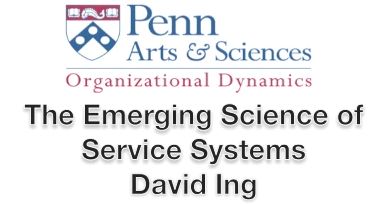For the 1st International Conference on Human Side of Service Innovation, I had been asked by Kelly Lyons to contribute an article for a session on Frameworks for Service Systems. I had worked on the article in fall 2011, but leading a 6-day conference in San Jose immediately before the start of the HSSE meeting in San Francisco made completion improbable. Having prepared an abstract and outline for “Is That Affordance Essential? Pathology in service systems and redesigns for sustainability”, I couldn’t squeeze in an article by the winter publication deadline. I was, however, prepared to share a presentation on research-in-progress. I expect that I’ll be able to finish this research paper over the next year, (and hope that I’ll get a longer time slot to present than the 15 minutes allotted at HSSE).
The original abstract for my presentation reads:
… Read more (in a new tab)A service systems may exhibit pathologies, i.e. an abnormal, unhealthy, maladjusted or inefficient state that is maintained in a living system for a significant period. Correcting a pathology may require a history-making change where significant capital investment is needed.
As a way of reframing the definition of a service system, interactions between parties are expressed as an interaction where a provider offers affordances and clients may have varying levels of ability. The needs and expectations of high-ability clients can be contrasted to those of low-ability clients. Portraying affordances as essential or discretionary may enable segmentation of client target groups into coproducing or full-service arrangements.
For the 1st International Conference on Human Side of Service Innovation, I had been asked by Kelly Lyons to contribute an article for a session on Frameworks for Service Systems. I had worked on the article in fall 2011, but leading a 6-day conference in San Jose immediately before the start of the HSSE meeting in San Francisco made completion improbable. Having prepared an abstract and outline for “Is That Affordance Essential? Pathology in service systems and redesigns for sustainability”, I couldn’t squeeze in an article by the winter publication deadline. I was, however, prepared to share a presentation on research-in-progress. I expect that I’ll be able to finish this research paper over the next year, (and hope that I’ll get a longer time slot to present than the 15 minutes allotted at HSSE).
The original abstract for my presentation reads:
… Read more (in a new tab)A service systems may exhibit pathologies, i.e. an abnormal, unhealthy, maladjusted or inefficient state that is maintained in a living system for a significant period. Correcting a pathology may require a history-making change where significant capital investment is needed.
As a way of reframing the definition of a service system, interactions between parties are expressed as an interaction where a provider offers affordances and clients may have varying levels of ability. The needs and expectations of high-ability clients can be contrasted to those of low-ability clients. Portraying affordances as essential or discretionary may enable segmentation of client target groups into coproducing or full-service arrangements.



